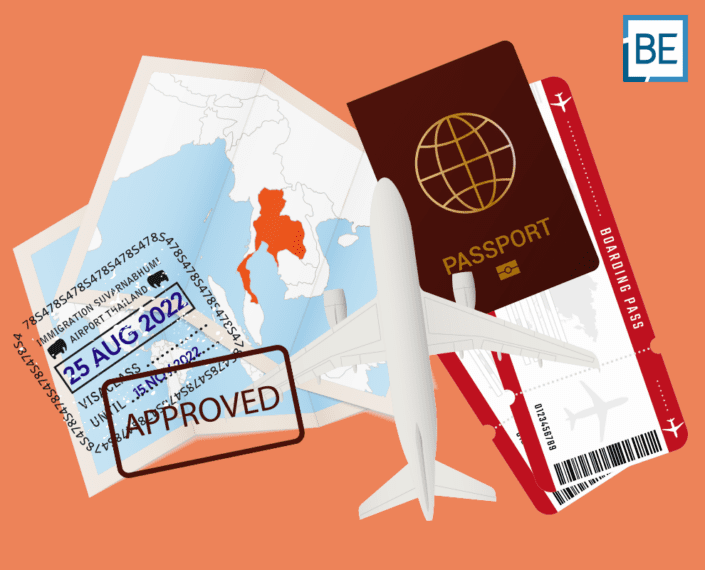en Thaïlande
Thailand is considering a new Work-from-Home law
23/08/2022
Due to the COVID-19 pandemic, much of the world allowed their staff to work from home. Thailand was no different and employers were asked to allow their employees to work-from-home in order to prevent infections spreading in the workplace.
These work-from-home measures proved to be hugely popular and have subsequently become the norm for employees. However, the pandemic has settled down and most employers have now scrapped their work-from-home policies. However, this may be about to change as the Thai parliament has recently passed the first reading of the so-called Work from Home Bill.
Points clés
- An amendment to the Labour Protection Act (LPA) is being considered that will allow employees to work-from-home.
- This amendment is being designed to provide more flexibility for both employees and employers, while also helping Thailand’s notorious traffic congestion.
- The amendment states that any work-from-home arrangement must be at least eight hours per week and must be counted as the employee’s normal working time.
Why has this amendment been made?
The legislative memorandum accompanying the bill states that the proposed amendments to the LPA have been designed to facilitate more flexibility in the country’s employment arrangements and provide suitable solutions for employers and employees. Furthermore, these amendments to the LPA seem to be a way for the government to tackle Bangkok’s ever increasing traffic congestion and also reduce energy consumption.
What does the amendment plan to introduce?
Currently, the bill introduces a new subsection to the LPA. This subsection states that an employer and the employee may agree that the employee is allowed to bring and perform work at home or at residence of the employee as part of their employment contract.
The amendment also states that any work-from-home arrangement must be at least eight hours per week and must be counted as the employee’s normal working time.
However, it appears that this amendment will not be mandatory and companies do not not need to adhere to it if they don’t want to. The phrase “may agree” suggests that the employer does not have to agree and thus there is no need to add this text to the LPA.
How has the amendment been received?
The term, ‘may agree’ is currently causing problems among Thailand’s law makers. The amendment was intended to be binding upon the employer, who in turn must agree if the employee wishes to work from home. However, during the public hearing stage of the amendment, several interested parties raised concerns about the ambiguity of the term ‘may agree’.
Furthermore, many parties, including the Department of Labour Protection and Welfare, do not appear to support the amendment.
Are there any issues with the amendment?
This proposed amendment has raised a lot of questions from employers about how to put this into practice. Examples include:
- Will there be exceptions contained within the amendment relating to certain types of work or industries e.g, construction, factory operations, cleaning services, restaurants and hospitality services?
- How can worker productivity be monitored?
- How should employers monitor overtime work?
- What is meant by ‘home’ and ‘residence’. For example, can employees work from a coffee shop instead?
- Do employers have to pay for employees’ internet and electricity used to perform work?
- Can employees bring office equipment and supplies home?
- How can employers manage occupational safety?
What is the amendment’s current status?
The amendment is currently under consideration by a subcommittee. Should the amendment pass the subcommittee, it will move onto a second reading in the parliament.
Comment Belaws peut-il vous aider ?
If you need more information about these changes to the Labour Protection Act may affect your business and the best ways to ensure full compliance, why not talk with one of our experts via WhatsApp.
Si vous souhaitez en savoir plus sur la manière dont nos experts peuvent répondre à vos besoins en matière de comptabilité et de secrétariat, veuillez consulter notre liste complète de services.
Veuillez noter que cet article est fourni à titre d'information seulement et ne constitue pas un avis juridique.
Nos consultations durent jusqu'à une heure et sont menées par des juristes experts qui parlent couramment l'anglais, le français et le thaï.
Les consultations peuvent être organisées sur WhatsApp ou sur le Logiciel de Vidéoconférence de votre convenance. Une consultation avec l’un de nos experts juridiques est sans aucun doute le meilleur moyen d’obtenir toutes les informations dont vous avez besoin et de répondre à toutes les questions que vous pourriez avoir sur votre nouvelle entreprise ou votre projet.
150 USD
Jusqu'à 1 heure
Paiement en ligne (Paypal ou carte bancaire)
Les consultations juridiques peuvent être menées en anglais, en français ou en thaï.
Les consultations juridiques sont assurées par des des avocats expérimentés dans les domaines concernés.
Questions fréquemment posées
Comment obtenir un visa de séjour de longue durée pour la Thaïlande ?
Ce visa sera disponible à partir de septembre 2022. Le demandeur doit également satisfaire aux critères de demande.
Combien de temps les étrangers peuvent-ils vivre en Thaïlande ?
Cela dépend du type de visa détenu par la personne concernée. Les personnes employées par une entreprise thaïlandaise, mariées à un ressortissant thaïlandais ou retraitées peuvent bénéficier d'une prolongation annuelle de leur visa. Les visas d'éducation et le Thailand Elite offrent également des séjours de longue durée à leurs détenteurs. La résidence permanente et la citoyenneté thaïlandaise sont également accessibles aux personnes remplissant les conditions requises.
Puis-je vivre en Thaïlande de façon permanente ?
Les personnes qui ont droit à un visa non-immigrant O peuvent prolonger leur séjour chaque année, pour autant qu'elles satisfassent aux exigences de la demande. Le programme Thailand Elite propose également des séjours de longue durée, qui peuvent être prolongés. Il est également possible d'obtenir la résidence permanente et la nationalité thaïlandaise (si les conditions d'obtention sont remplies).
Peut-on obtenir une résidence permanente en Thaïlande ?
Oui, la Thaïlande offre la résidence permanente pour ceux qui répondent aux critères de demande.
Les étrangers peuvent-ils prendre leur retraite en Thaïlande ?
Oui, la Thaïlande propose un visa non immigrant O pour les retraités. Il existe toutefois des conditions à remplir avant de pouvoir déposer une demande. Il s'agit par exemple d'exigences financières et d'assurance mensuelles/annuelles.
Puis-je rester en Thaïlande pendant 12 mois ?
La Thaïlande propose différentes options de visa pour les personnes qui souhaitent rester un an (sous réserve des conditions de qualification). Il s'agit par exemple du visa Thaïlande Elite, du visa éducation, du visa retraite, etc.
Quels sont les avantages du visa LTR en Thaïlande ?
Les titulaires d'un visa LTR peuvent bénéficier de nombreux avantages attrayants conçus pour faciliter la vie en Thaïlande à long terme et réduire les formalités administratives
- Un taux réduit d'impôt sur le revenu des personnes physiques :
- Autorisation de travailler en Thaïlande
- Procédure accélérée dans les aéroports internationaux
- 1 an de déclaration à l'immigration au lieu de 90 jours
Qui peut prétendre au visa LTR pour la Thaïlande ?
Le visa LTR a été conçu pour les personnes qui ont suffisamment d'expérience professionnelle, de revenus et de biens, c'est-à-dire les expatriés "à haut potentiel".
Essentiellement, le visa LTR sera accessible aux groupes suivants :
- Un investisseur souhaitant investir au moins 500 000 USD en Thaïlande.
- Un retraité fortuné.
- Un professionnel hautement qualifié
Articles connexes
Abonnez-vous aujourd'hui
Abonnez-vous aujourd'hui
À notre newsletter pour les dernières actualités juridiques
en Asie du Sud-Est, les mises à jour de Belaws et
les offres spéciales sur nos services.
To our newsletter today for all the latest legal news in South East Asia,
Belaws updates and special promotions on our services.







